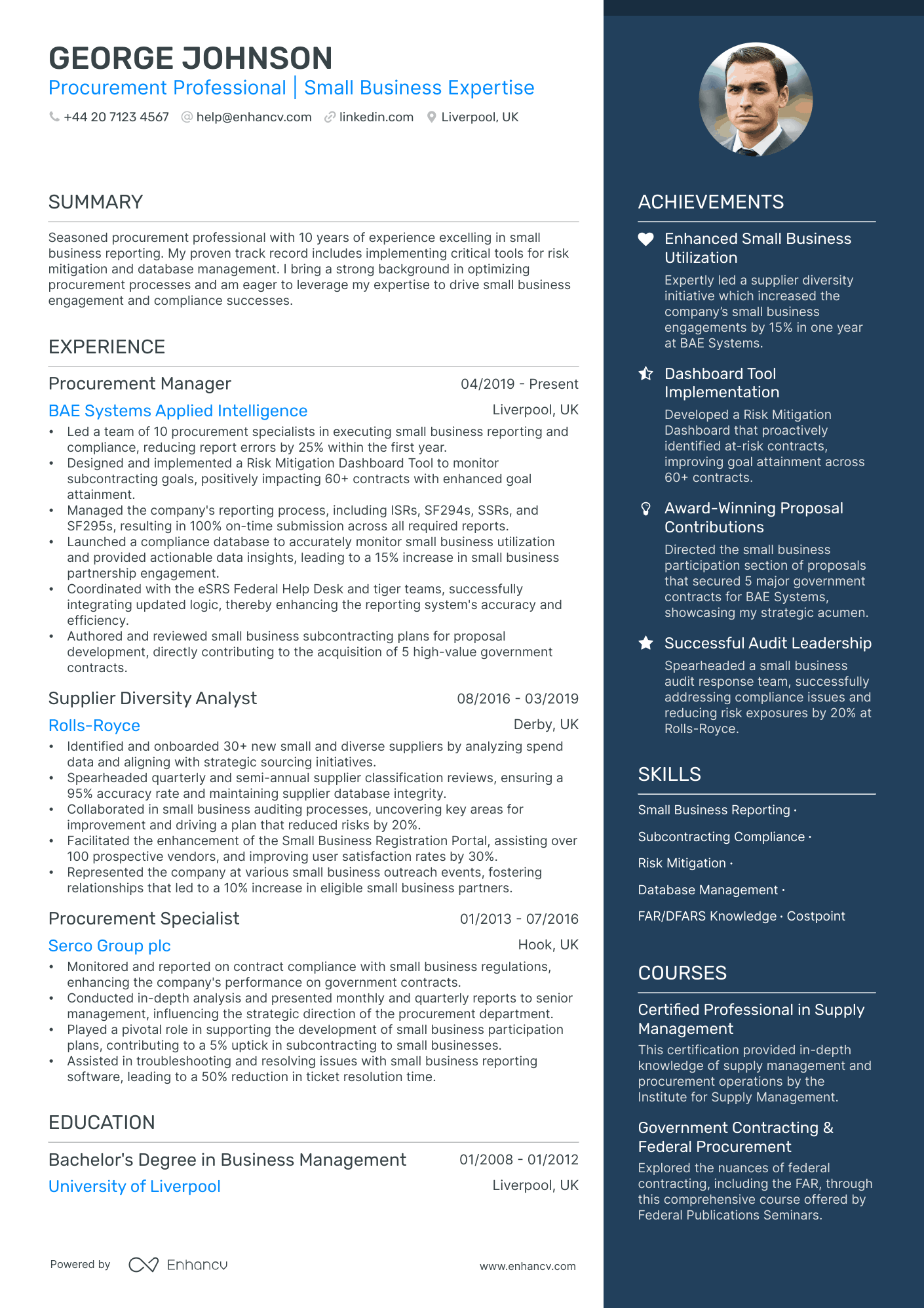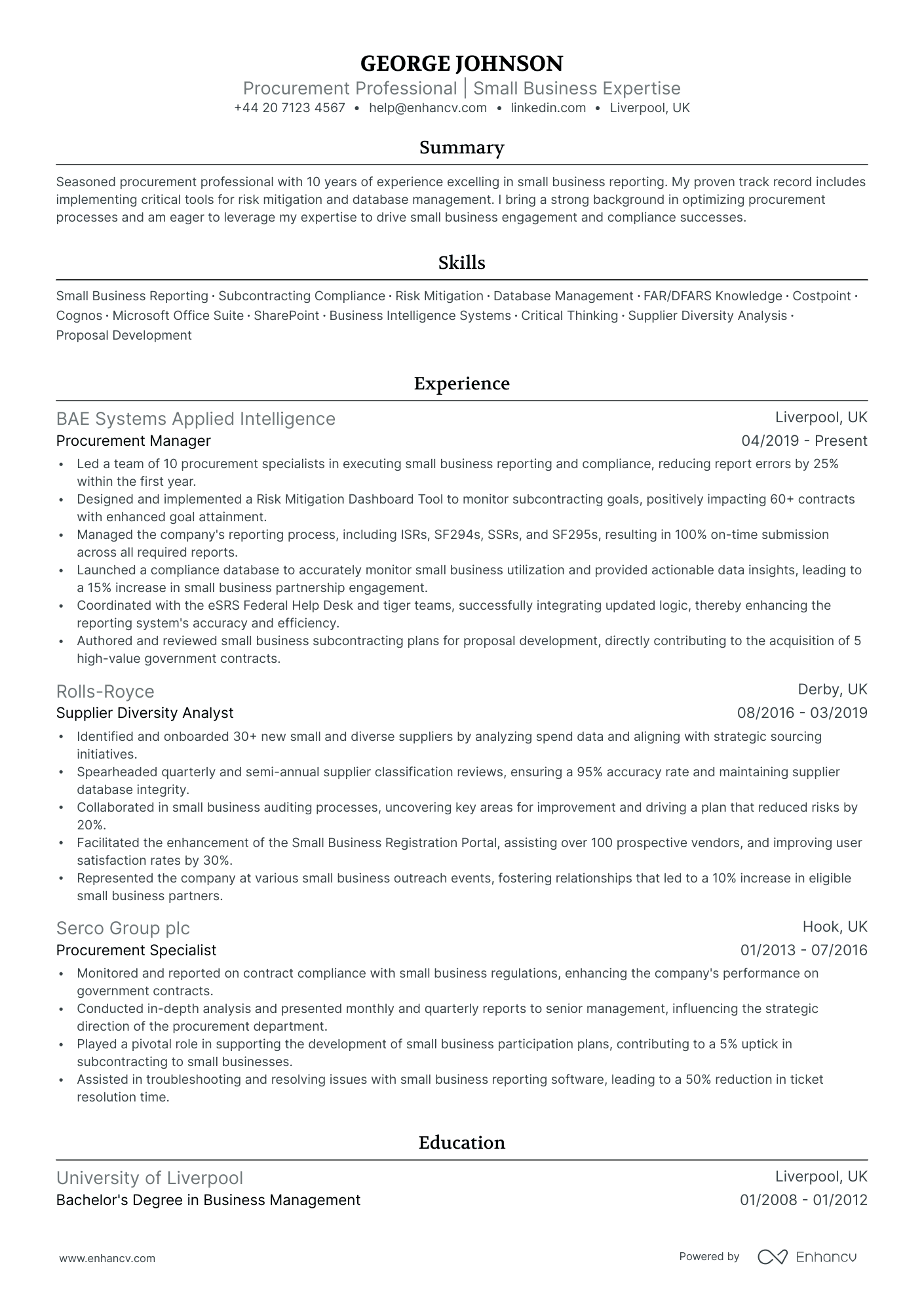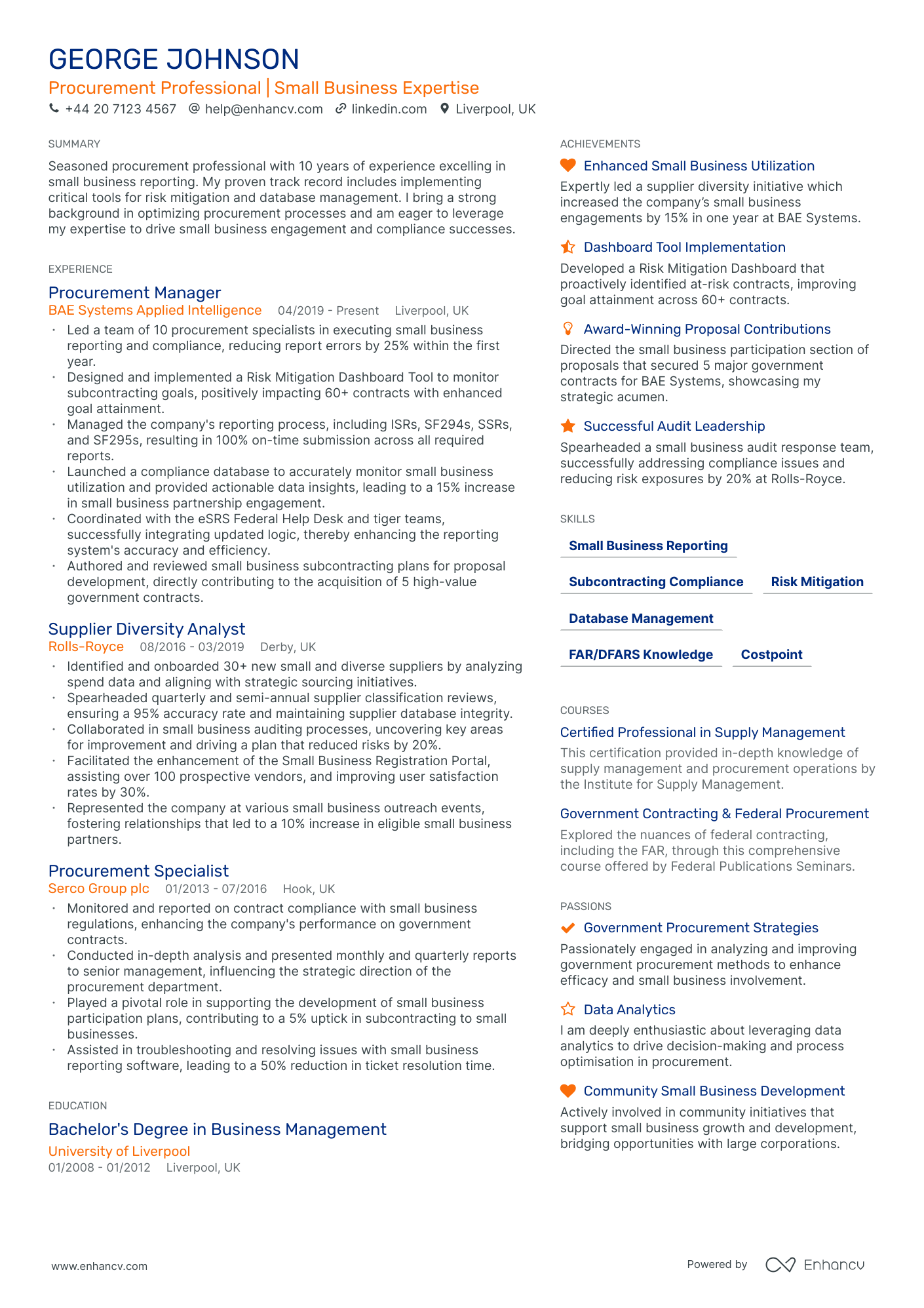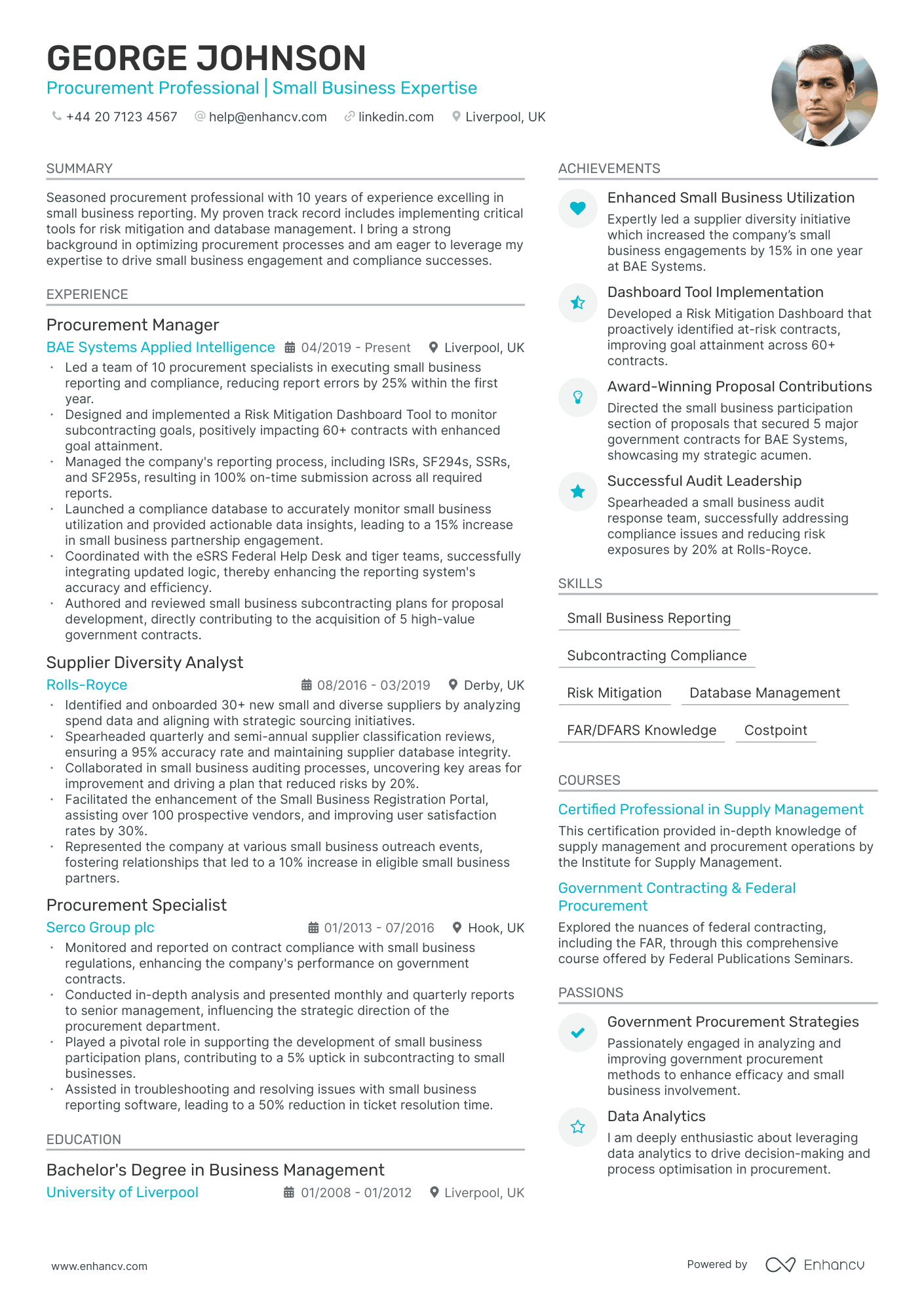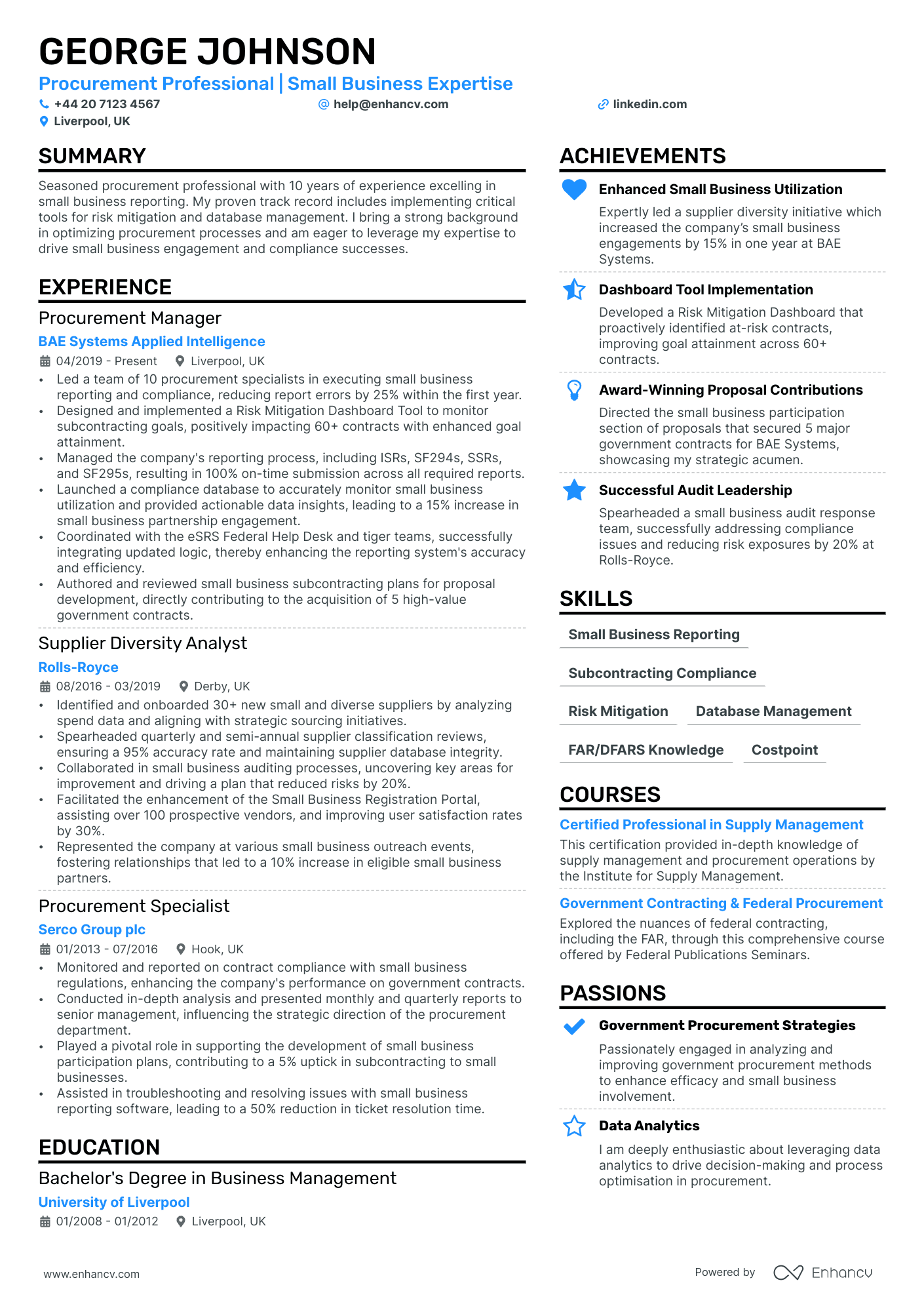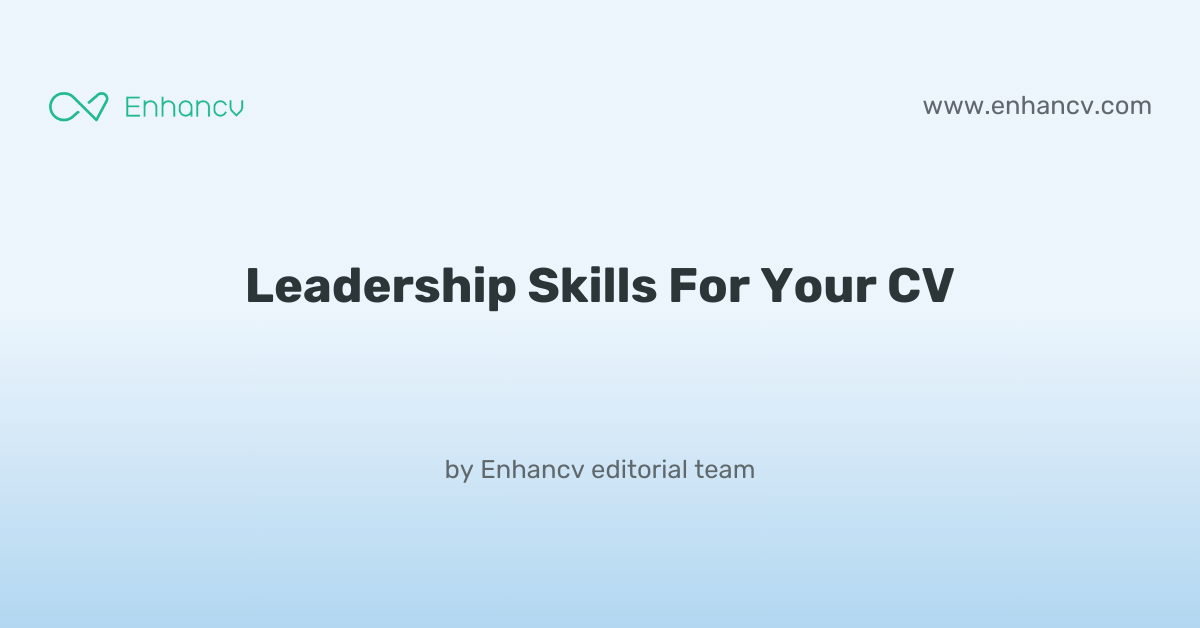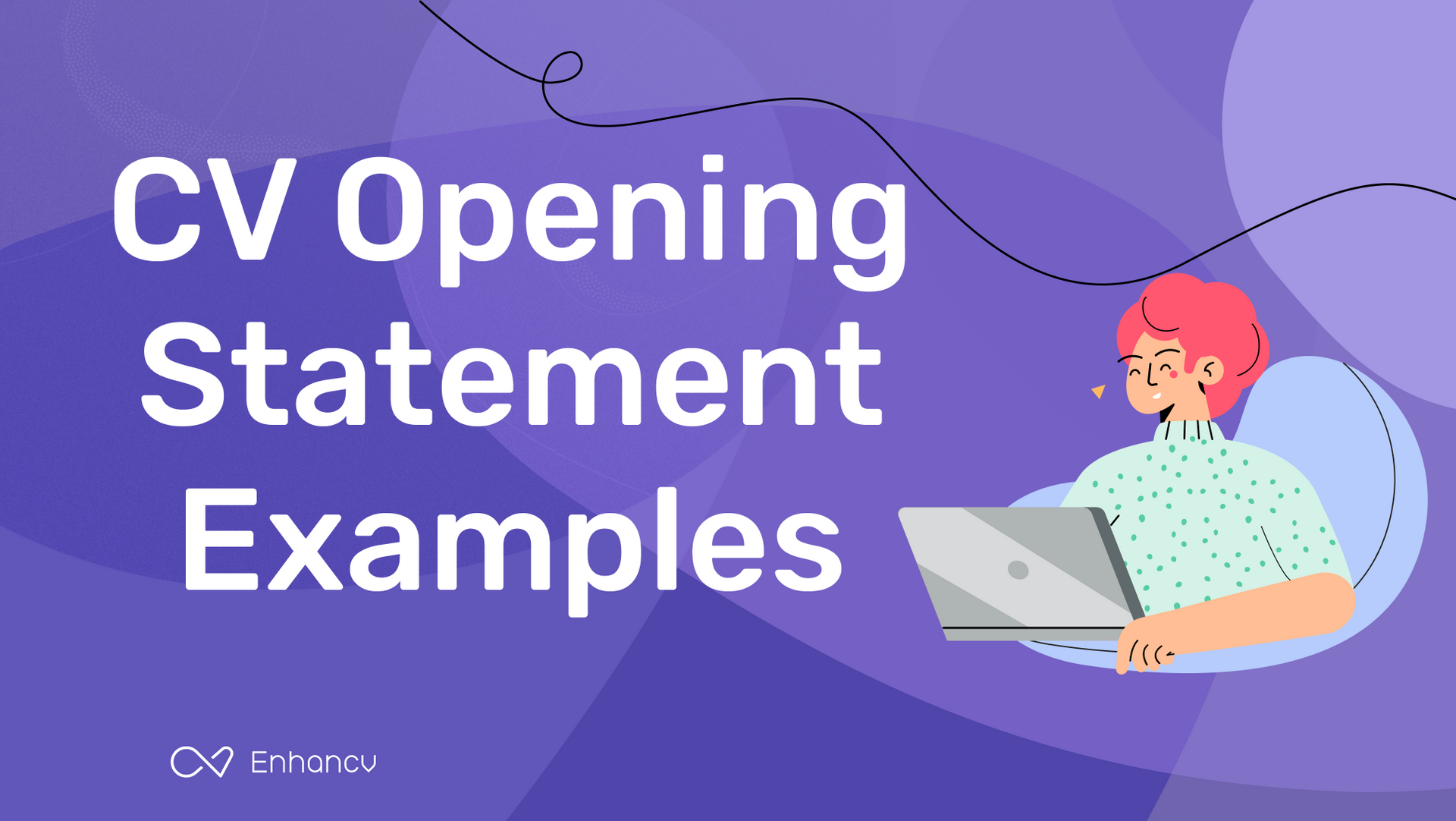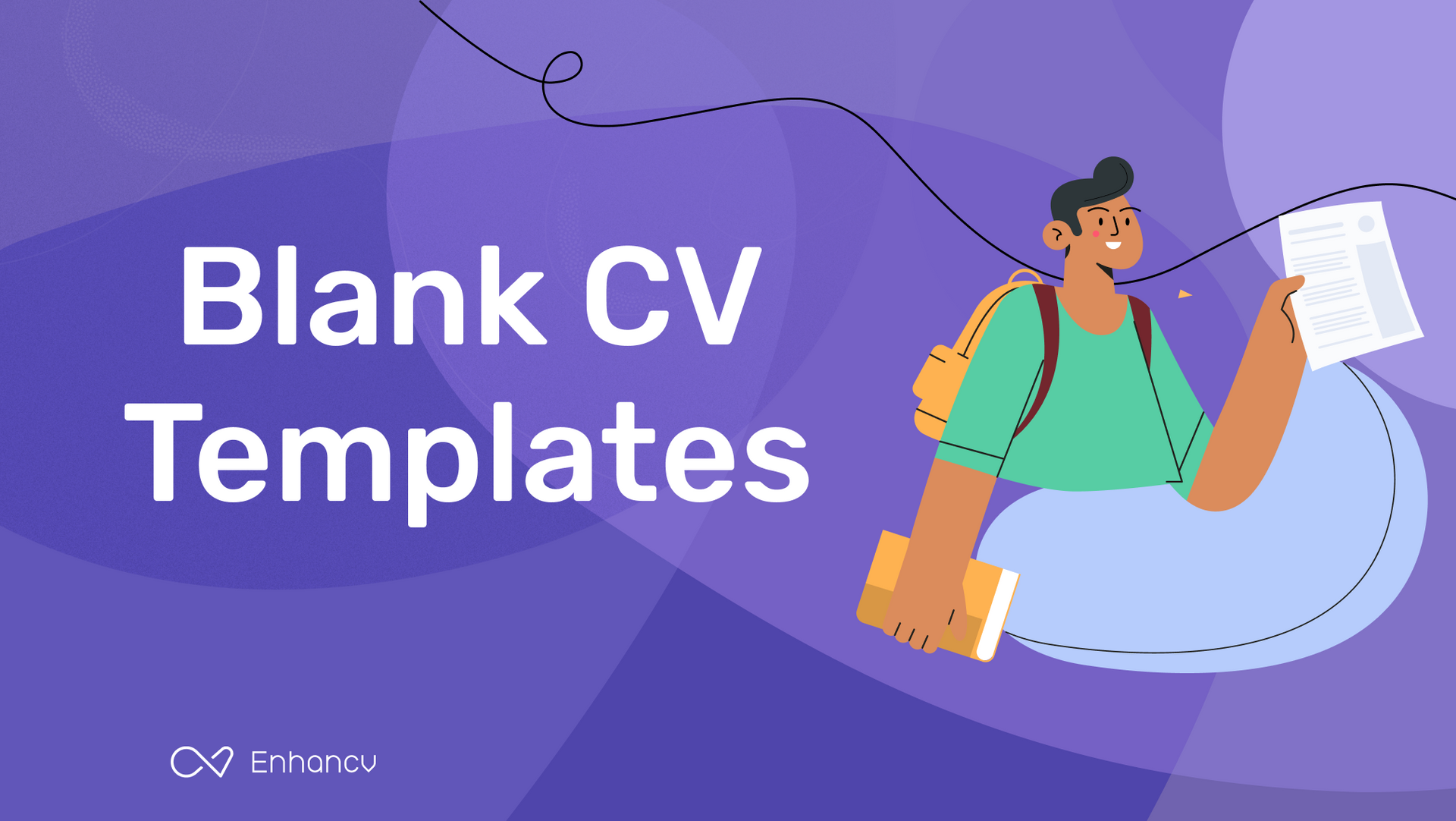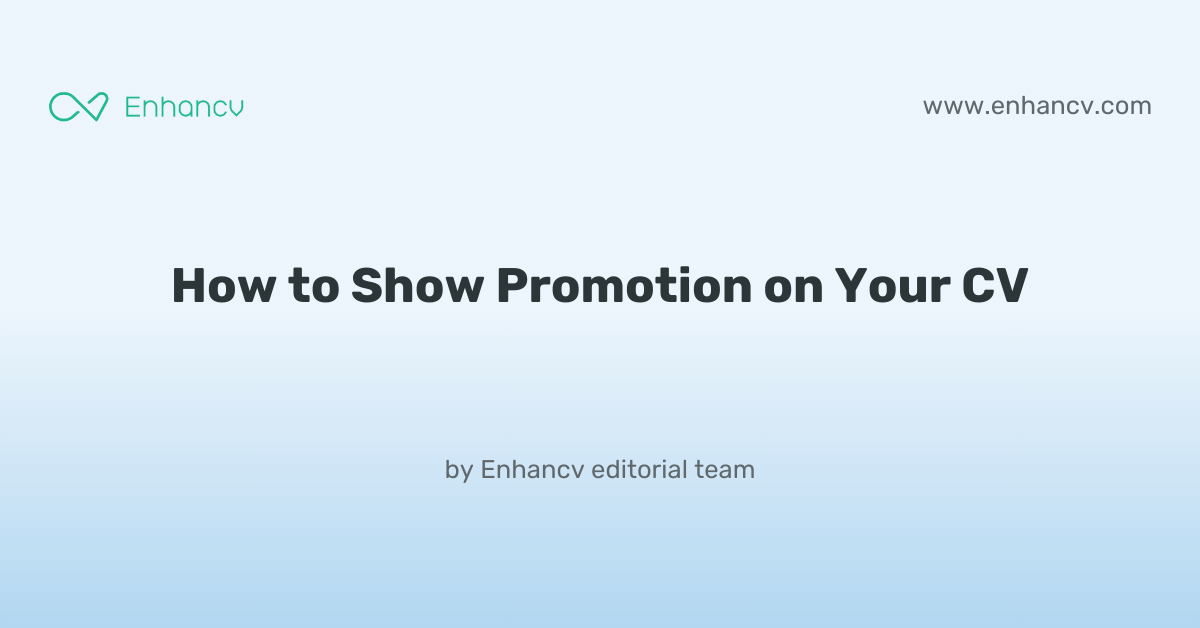Crafting a standout CV can be an uphill battle when competing against larger companies for top talent. Our guide offers practical steps to elevate your CV, ensuring it showcases the unique strengths and opportunities your small business has to offer.
- Applying the simplest CV design, so that recruiters can easily understand your expertise, skills, and professional background;
- Ensuring you stand out with your header, summary or objective statement, and a designated skills section;
- Creating your CV experience section - no matter how much expertise you have;
- Using real life professional CV examples to enhance the structure and outline of your profile.
If you still have no muse to write your professional CV, find some more industry-leading examples.
- Relationship Manager CV Example
- Entry Level Business Analyst CV Example
- Manager CV Example
- Category Manager CV Example
- Business Development CV Example
- Senior Business Analyst CV Example
- Business Intelligence CV Example
- Management Consultant CV Example
- Business Analyst CV Example
- Investment Manager CV Example
Formatting your small business owner CV to meet the role expectations
Staring at the blank page for hours on end, you still have no idea how you should start your professional small business owner CV. Should you include more colours, two columns, and which sections? What you should remember about your CV format is this - ensure it's minimalistic and doesn't go over the top with fancy fonts and many colours. Instead, focus on writing consistent content that actually answers the job requirements. But, how about the design itself :- Use the reverse chronological order to showcase your experience, starting with your most recent role;
- Include your contact details (email address, phone number, and location) - and potentially your professional photo - in the header;
- Must-have CV sections include summary or objective, experience, education, and skills: curate the ones that fit your profile;
- Your professional small business owner CV should be between one-to-two pages long: select the longer format if you have more experience.
A little bit more about your actual CV design, ensure you're using:
- plenty of serif or sans serif font (e.g. Montserrat, Exo 2, Volkhov) as they are Applicant Tracker System (ATS) compliant. Avoid the likes of Arial and Times New Roman because most candidates' CVs are in this typography.
When submitting your CV, are you still not sure what format it should be? Despite the myth that has been circling around, most modern ATS systems are perfectly capable of reading PDFs. This format is an excellent choice as it keeps all of your information intact.
PRO TIP
Be mindful of white space; too much can make the CV look sparse, too little can make it look cluttered. Strive for a balance that makes the document easy on the eyes.
The top sections on a small business owner CV
- Professional Summary outlines the owner's vision and achievements because it sets the stage for their entrepreneurial mindset.
- Business Management Experience shows a track record of successes and lessons that are crucial for potential partnerships or roles.
- Key Projects & Accomplishments highlight specific instances of the owner's capability to drive business growth which indicates potential.
- Financial Acumen demonstrates the owner's ability to manage budgets and increase profitability, a skill valuable to any role.
- Leadership & Team Building offers insight into how the owner motivates and manages teams which is vital for collaboration and culture fit.
What recruiters value on your CV:
- Highlight entrepreneurial skills by detailing your experience with business strategy, including the creation, growth, and management of your business, as all are valuable skills that showcase leadership and innovation.
- Emphasise your financial acumen by mentioning budget management, financial planning, and profit growth, which reflect your ability to responsibly handle a company's financial health.
- Showcase your versatility by explaining your hands-on experience in multiple aspects of running a business such as sales, marketing, operations, and customer service, to demonstrate a comprehensive skillset.
- Outline your networking abilities, including relationship building with vendors, customers, and other business owners that can indicate strong interpersonal and communication skills.
- Include problem-solving examples, like navigating business challenges or developing unique solutions, as this indicates critical thinking and adaptability, qualities essential for business success.
Recommended reads:
Tips and tricks on writing a job-winning small business owner CV header
The CV header is the space which most recruiters would be referring most often to, in the beginning and end of your application. That is as the CV header includes your contact details, but also a headline and a professional photo. When writing your CV header:
- Double-check your contact details for spelling errors or if you've missed any digits. Also, ensure you've provided your personal details, and not your current work email or telephone number;
- Include your location in the form of the city and country you live in. If you want to be more detailed, you can list your full address to show proximity to your potential work place;
- Don't include your CV photo, if you're applying for roles in the UK or US, as this may bias initial recruiters' assessments;
- Write a professional headline that either integrates the job title, some relevant industry keywords, or your most noteworthy achievement.
In the next part of our guide, we'll provide you with professional CVs that showcase some of the best practices when it comes to writing your headline.
Examples of good CV headlines for small business owner:
- Boutique Owner & Fashion Curator | Retail Management Expert | Certified Style Consultant | 10+ Yrs Industry Leadership
- IT Solutions Director | Cloud Infrastructure Specialist | Cybersecurity Certification | 12 Years Progressive Experience
- Master Chef & Restaurateur | Culinary Arts Degree | Innovative Menu Development | Hospitality Leadership, 15 Years
- Independent Publisher | Award-Winning Editor | MA Literature | Industry Innovator | 8 Years Publishing Excellence
- Professional Landscaper | Horticulture Degree | Sustainable Design Advocate | 20+ Years Leading Garden Projects
- Automotive Repair Shop Owner | ASE Certified Master Technician | Engine Performance Expert | 17-Year Trade Veteran
What's the difference between a small business owner CV summary and objective
Why should it matter to you?
- Your small business owner CV summary is a showcasing your career ambitions and your unique value. Use the objective to answer why your potential employers should hire you based on goals and ambitions. The objective is the ideal choice for candidates who happen to have less professional experience, but still meet some of the job requirements.
Before you select which one will be more relevant to your experience, have a look at some industry-leading CV summaries and objectives.
CV summaries for a small business owner job:
- With over 10 years of hands-on experience as a thriving restaurant owner, I bring a wealth of knowledge in food service management, customer engagement, and inventory control. Successfully grew the business by 150% through strategic marketing and menu development.
- Dedicated owner of a boutique digital marketing agency for 8 years, adept at SEO, content creation, and social media strategies, boosting client online presence by an average of 300%. Spearheaded a successful brand overhaul for a major client, increasing their market share significantly.
- Former Senior Project Manager with 12 years in construction seeking to leverage extensive background in project oversight, budget management, and sustainability practices to transition into the restaurant industry with a focus on environmentally conscious food service solutions.
- Experienced IT professional with 15 years in software development, aiming to apply problem-solving skills, expertise in Agile methodologies, and passion for technology to embark on a new venture in the competitive world of small business ownership.
- As an entrepreneurial hopeful with a recent MBA specialising in small business management, I am eager to apply my academic knowledge of market analysis, financial planning, and strategic leadership to establish a cutting-edge ecommerce platform.
- Possessing a degree in Environmental Science and avid volunteer experience, I am driven to start a green-initiative consulting firm where I can utilise my knowledge of sustainability and passion for ecological advocacy to assist businesses in reducing their environmental impact.
Best practices for writing your small business owner CV experience section
If your profile matches the job requirements, the CV experience is the section which recruiters will spend the most time studying. Within your experience bullets, include not merely your career history, but, rather, your skills and outcomes from each individual role. Your best experience section should promote your profile by:
- including specific details and hard numbers as proof of your past success;
- listing your experience in the functional-based or hybrid format (by focusing on the skills), if you happen to have less professional, relevant expertise;
- showcasing your growth by organising your roles, starting with the latest and (hopefully) most senior one;
- staring off each experience bullet with a verb, following up with skills that match the job description, and the outcomes of your responsibility.
Add keywords from the job advert in your experience section, like the professional CV examples:
Best practices for your CV's work experience section
- Developed and implemented a comprehensive business strategy that resulted in a 20% annual growth in sales, demonstrating strong strategic planning and business development skills.
- Managed day-to-day operations, including supply chain, inventory management, and staff scheduling, ensuring the business ran smoothly and efficiently.
- Established and nurtured relationships with over 100 vendors and suppliers, highlighting excellent negotiation and partnership-building abilities.
- Launched successful marketing campaigns across multiple channels, leading to a 35% increase in brand awareness and customer base over two years.
- Analysed market trends and customer feedback to drive product development and diversification, which expanded the company's offerings by 40%.
- Spearheaded the adoption of new technology that improved payment processes and customer experience, reflecting a keen eye for innovation.
- Recruited, trained, and led a team of 15 employees, fostering a culture of excellence and accountability in the workplace.
- Managed financial operations, including budgeting, forecasting, and accounting, maintaining healthy cash flow and profitability for the business.
- Ensured compliance with relevant laws and regulations, maintaining impeccable records and upholding the highest standards of ethics and corporate governance.
- Scaled small e-commerce business operations to support a 300% increase in customer order volume within a 2-year span, ensuring smooth logistics and customer satisfaction.
- Implemented an innovative digital marketing strategy that boosted online sales by 150%, significantly growing the company's market share and online presence.
- Negotiated with suppliers to reduce raw material costs by 20%, increasing profit margins without compromising on product quality.
- Drove a boutique consultancy firm to achieve a 50% revenue growth by expanding services into emerging technology sectors, such as AI and IoT.
- Masterminded the rebranding initiative that attracted a more diversified client base, boosting client retention rates by 35%.
- Increased efficiency by implementing project management software, reducing project completion times by an average of 15%.
- Pioneered an art studio and gallery, increasing local artist representation by 100+ artists, thus enriching the community's cultural fabric.
- Developed and hosted monthly art events that attracted over 300 visitors per event, heightening community engagement and artist exposure.
- Cultivated partnerships with local businesses which led to a collaboration on art-based projects, enhancing the studio’s revenue by 25%.
- Established a gourmet food truck, tapping into a new market segment in the city, resulting in a steady 20% monthly increase in sales.
- Engaged in strategic social media campaigns that resulted in a 40% increase in online engagement and a substantial increase in brand recognition.
- Sourced high-quality, local produce which improved product taste and customer satisfaction, leading to a 30% surge in repeat customers.
- Launched an IT service company, securing contracts with 5 major local businesses within the first year, laying a solid foundation for future growth.
- Led a team to develop custom software solutions that increased our clients’ operational efficiency by up to 40%.
- Forged a successful partnership with a software vendor which expanded our service offerings and drove a 30% increase in annual revenue.
- Managed and operated a boutique, growing monthly sales figures to surpass targets by 25% through aggressive networking and community engagement initiatives.
- Created a customer loyalty program which was instrumental in increasing customer return rate by 20%.
- Streamlined store operations which decreased overhead costs by 15% while maintaining quality customer service.
Lacking professional expertise: how to write your CV to highlight your best talents
Don't count on your lucky stars when you're applying for a role, where you happen to have less (or almost none) professional experience. Recruiters sometimes do hire inexperienced candidates if they're able to present their unique value from the get-go. So, instead of opting for the traditional, CV experience section:
- List any applicable expertise you happen to have - no matter if it's a part-time job, internship, or volunteer work. This would hint to recruiters that your profile is relevant;
- Focus your CV on your transferrable skills or talents you've obtained thanks to your whole life and work experience. In effect, you'll be spotlighting your value as a candidate;
- Separate more space for your applicable academic background and certificates to show you have the technical know-how;
- Ensure that within your objective, you've defined why you'll like the job and how you'll be the perfect match for it. Always ensure you've tailored your CV to individual applications.
Looking for more good examples for your first job? We'll show you how other candidates, with less professional experience, have created their job-winning CVs.
Recommended reads:
PRO TIP
Describe how each job helped you grow or learn something new, showing a continuous development path in your career.
Key small business owner CV skills: what are hard skills and soft skills
Let's kick off with the basics. You know that you have to include key job requirements or skills across your CV. For starters, take individual skills from the job description and copy-paste them into your CV, when relevant. Doing so, you'll ensure you have the correct skill spelling and also pass the Applicant Tracker System (ATS) assessment. There are two types of skills you'll need to include on your CV:
- Hard skills - technical abilities that are best defined by your certificates, education, and experience. You could also use the dedicated skills section to list between ten and twelve technologies you're apt at using that match the job requirements.
- Soft skills - your personal traits and interpersonal communication skills that are a bit harder to quantify. Use various CV sections, e.g. summary, strengths, experience, to shine a spotlight on your workspace achievements, thanks to using particular soft skills.
Remember that your job-winning CV should balance both your hard and soft skills to prove your technical background, while spotlighting your personality.
Top skills for your small business owner CV:
Financial Management
Business Planning
Marketing Strategies
Sales Expertise
Customer Relationship Management
Supply Chain Coordination
Human Resource Management
Compliance Knowledge
Operational Efficiency
Digital Literacy
Leadership
Problem-Solving
Communication
Time Management
Adaptability
Strategic Thinking
Decision Making
Negotiation
Critical Thinking
Teamwork
PRO TIP
If you have received professional endorsements or recommendations for certain skills, especially on platforms like LinkedIn, mention these to add credibility.
CV education and certificates: your academic background as proof of your skill set
A common misconception about your small business owner CV education is that you only need it, if you have less professional experience. That is completely false. The CV education section serves to back up your technical (and sometimes personal) capabilities, fill in gaps in your work history, and show you have the initial industry background and know-how. When creating your education section:
- List your degrees in the reverse chronological order, starting with the most recent (and relevant) ones first;
- Include your degree and university names, start and graduation dates. It's optional to also denote you received a "First-Class Honours" for diplomas that are more relevant to the role;
- Curate your relevant university coursework, projects, or thesis work if you happen to have less professional expertise and need to integrate more job keywords and skills.
Your professional qualifications don't need to stop at your academic background. It's advisable to also select up to three of your most noteworthy (and relevant) industry certificates and feature them in a dedicated section. Once more, include the certificate name, the institution that issued it out, and the date you obtained it on. You could feature both hard skills and soft skills certificates, as in the examples below:
PRO TIP
Focus on describing skills in the context of the outcomes they’ve helped you achieve, linking them directly to tangible results or successes in your career.
Recommended reads:
Key takeaways
What matters most in your small business owner CV-writing process is for you to create a personalised application. One that matches the role and also showcases your unique qualities and talents.
- Use the format to supplement the actual content, to stand out, and to ensure your CV experience is easy to comprehend and follows a logic;
- Invest time in building a succinct CV top one third. One that includes a header (with your contact details and headline), a summary or an objective statement (select the one that best fits your experience), and - potentially - a dedicated skills section or achievements (to fit both hard skills and soft skills requirements);
- Prioritise your most relevant (and senior) experience closer to the top of your CV. Always ensure you're following the "power verb, skill, and achievement" format for your bullets;
- Integrate both your technical and communication background across different sections of your CV to meet the job requirements;
- List your relevant education and certificates to fill in gaps in your CV history and prove to recrutiers you have relevant technical know-how.
